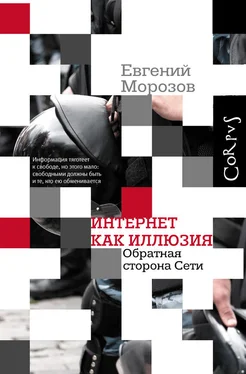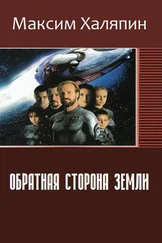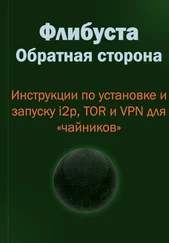Gane, N. Speed Up or Slow Down? Social Theory in the Information Age // Information, Communication & Society 9, no. 1 (2006): 20–38.
Gladney, G. A. Technologizing of the Word: Toward a Theoretical and Ethical Understanding // Journal of Mass Media Ethics 6, no. 2 (1991): 93–105.
Graham, S., and S. Marvin Planning Cybercities? Integrating Telecommunications into Urban Planning // Town Planning Re-view 70, no. 1 (1999): 89–114.
Grier, David Alan When Computers Were Human . Princeton, NJ: Princeton University Press, 2005.
Grint, K., and S. Woolgar On Some Failures of Nerve in Con-structivist and Feminist Analyses of Technology // Science, Techno-logy & Human Values 20, no. 3 (1995): 286.
Halleck, DeeDee Hand-Held Visions: The Impossible Possibilities of Community Media . New York: Fordham University Press, 2002.
Hand, M., and B. Sandywell E-topia as Cosmopolis or Citadel: On the Democratizing and De-Democratizing Logics of the Internet, or, Toward a Critique of the New Technological Fetishism // Theory, Culture & Society 19, no. 1–2 (2002): 197.
Hannay, N. B., and R. E. McGinn The Anatomy of Modern Tech-nology: Prolegomenon to an Improved Public Policy for the Social Management of Technology // Daedalus 109, no. 1 (1980): 25–53.
Headrick, Daniel R. The Invisible Weapon: Telecommunications and International Politics, 1851–1945. New York: Oxford Univer-sity Press, 1991.
Headrick, Daniel R. The Tools of Empire: Technology and European Imperialism in the Nineteenth Century . New York: Oxford Univer-sity Press, 1981.
Headrick, Daniel R. When Information Came of Age: Technolo-gies of Knowledge in the Age of Reason and Revolution, 1700–1850. New York: Oxford University Press, 2000.
Heidegger, Martin The Question Concerning Technology, and Other Essays . New York: Harper Perennial, 1982.
Henderson, Peter Coal Fuels Much of Internet Cloud, Says Green-peace // Reuters, March 30, 2010.
Herf, J. Technology, Reification, and Romanticism // New German Critique (1977): 175–191.
Hine, C. Internet Research and the Sociology of Cyber-Social-Scientific
Knowledge // Information Society 21, no. 4 (2005): 239–248. Hughes, Thomas P. Human-Built World: How to Think About
Technology and Culture . Chicago: University of Chicago Press, 2004.
Hughes, Thomas P. Lusting for the Gratifications of Technology //
Reviews in American History 14, no. 2 (1986): 265–269. Hughes, Thomas P. The Seamless Web: Technology, Science, Etcetera,
Etcetera // Social Studies of Science 16, no. 2 (1986): 281–292. Ihde, Don Ironic Technics . Copenhagen: Automatic Press, 2008. Introna, L. D. Maintaining the Reversibility of Foldings: Making the
Ethics (Politics) of Information Technology Visible // Ethics and In-formation Technology 9, no. 1 (2007): 11–25.
Jacobs, M., Novak, W. J., and J. E. Zelizer The Democratic Ex-periment: New Directions in American Political History . Princeton, NJ: Princeton University Press, 2003.
Jones, S. Fizz in the Field: Toward a Basis for an Emergent Internet
Studies // Information Society 21, no. 4 (2005): 233–237. Katz-Kimchi, M. Historicizing Utopian Popular Discourse on the
Internet in America in the 1990 s: Positions, Comparison, and Con-textualization . Presentation at The Long History of New Media conference, Montreal, May 22, 2008.
Kenny, Charles Revolution in a Box // Foreign Policy (November 2009).
Khiabany, G. Globalization and the Internet: Myths and Realities // Trends in Communication 11, no. 2 (2003): 137–153.
Kling, R. Reading “All About” Computerization: How Genre Conventions Shape Nonfiction Social Analysis // Information Society 10, no. 3 (1994): 147–172.
Latour, B., and P. Weibel Making Things Public: Atmospheres of Democracy . Cambridge, MA: MIT Press, 2005.
Layton, E. T., Jr. Technology as Knowledge // Technology and Cul-ture (1974): 31–41.
Mackay, H., and G. Gillespie Extending the Social Shaping of Technology Approach: Ideology and Appropriation // Social Studies of Science 22, no. 4 (1992): 685–716.
MacKenzie, D. Knowing Machines: Essays on Technical Change . Cambridge, MA: MIT Press, 1998.
Mander, J. Four Arguments for the Elimination of Television . Goa, India: Other India Press, 1998.
Mander, J. In the Absence of the Sacred: The Failure of Technology and the Survival of the Indian Nations . San Francisco: Sierra Club Books, 1991.
Manjoo, F. The Co-Founders of Twitter Say It Will Change the World. They Should Remind People That It’s Also Fun // Slate, April 15, 2010.
Marx, L. The Pilot and the Passenger: Essays on Literature, Technology, and Culture in the United States . New York: Oxford University Press, 1988.
Marx, L. Technology: The Emergence of a Hazardous Concept // Social Research 64, no. 3 (1997): 965–988.
McFarland, F. B. Clarence Ayres and His Gospel of Technology // History of Political Economy 18, no. 4 (1986): 617.
McLoughlin, I., Badham, R., and P. Couchman Rethinking Political Process in Technological Change: Socio-Technical Configu-rations and Frames // Technology Analysis & Strategic Management 12, no. 1 (2000): 17–37.
Melzer, A. M., Weinberger, J., and M. R. Zinman Techno-logy in the Western Political Tradition . Ithaca, NY: Cornell Univer-sity Press, 1993.
Merrin, W. Media Studies 2.0 : Upgrading and Open-Sourcing the Dis-cipline // Interactions: Studies in Communication and Culture 1 (2009): 17–34.
Michael, D. N. Too Much of a Good Thing? Dilemmas of an Infor-mation Society // Technological Forecasting and Social Change 25, no. 4 (1984): 347–354.
Mickelson, Sig From Whistle Stop to Sound Bite: Four Decades of Politics and Television . New York: Praeger, 1989.
Misa, T. J. How Machines Make History, and How Historians (and Others) Help Them to Do So // Science, Technology, and Human Values (1988): 308–331.
Misa, T. J. Leonardo to the Internet: Technology and Culture from the Renaissance to the Present . Baltimore: Johns Hopkins University Press, 2004.
Misa, T. J. Theories of Technological Change: Parameters and Purposes // Science, Technology, and Human Values 17, no. 1 (1992): 3–12. Misa, T. J., Brey, Philip, and Andrew Feenberg Modernity and Technology . Cambridge, MA: MIT Press, 2004.
Mosco, V. From Here to Banality: Myths About New Media and Com-munication Policy // Seeking Convergence in Policy and Practice (2004): 23.
Mosco, V. Review Essay: Approaching Digital Democracy // New Me-dia & Society (2009).
Mosco, V., and D. Foster Cyberspace and the End of Politics //
Journal of Communication Inquiry 25, no. 3 (2001): 218. Mowshowitz, A. Computers and the Myth of Neutrality / In: Pro-ceedings of the ACM 12th Annual Computer Science Conference on SIGCSE Symposium, 92. 1984.
Munir, K. A., and M. Jones Discontinuity and After: The Social Dynamics of Technology Evolution and Dominance // Organization Studies 25, no. 4 (2004): 561.
Nerone, J. The Future of Communication History // Critical Studies in Media Communication 23, no. 3 (2006): 254–262.
Neuman, J. The Media’s Impact on International Affairs, Then and Now // SAIS Review 16 (1996): 109–124.
Nguyen, A. The Interaction Between Technologies and Society: Lessons Learned from 160 Evolutionary Years of Online News Services // First Monday 12, no. 3–5 (2007).
Читать дальше
Конец ознакомительного отрывка
Купить книгу











